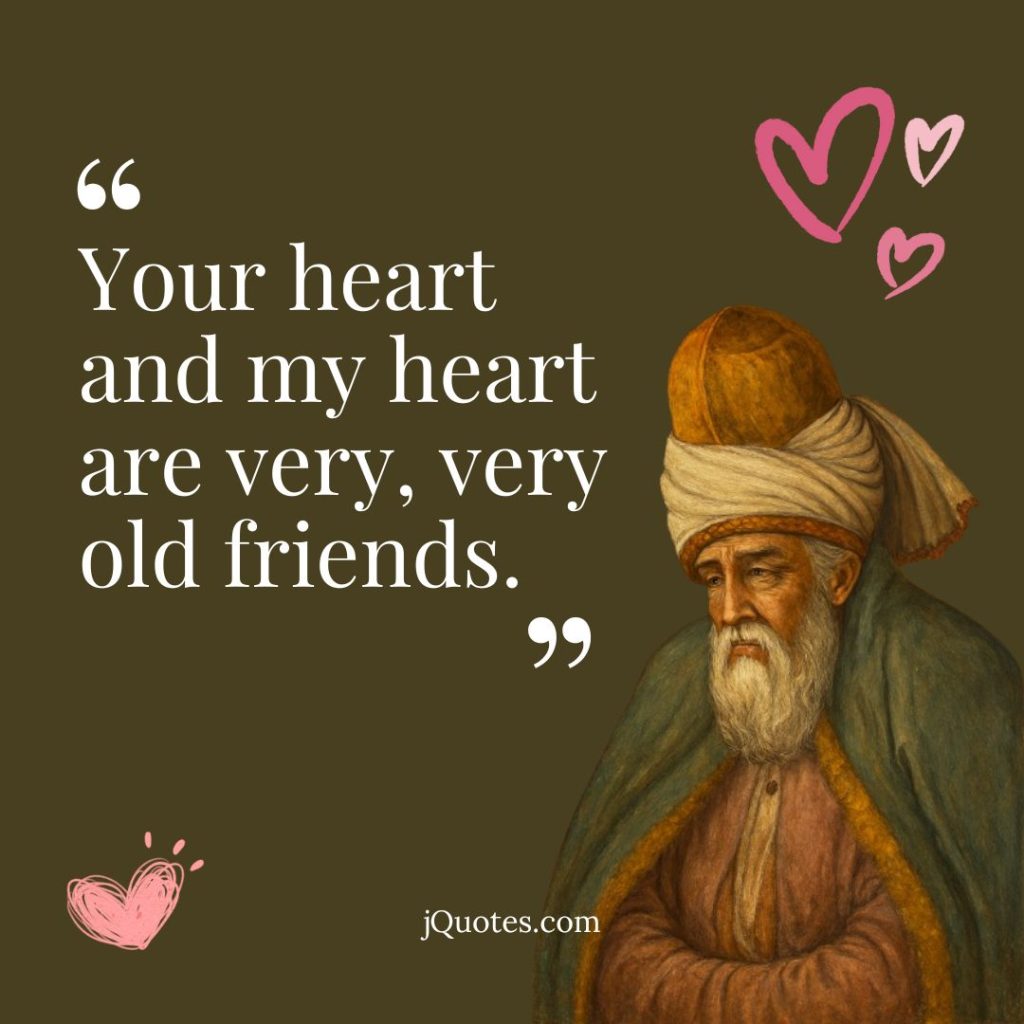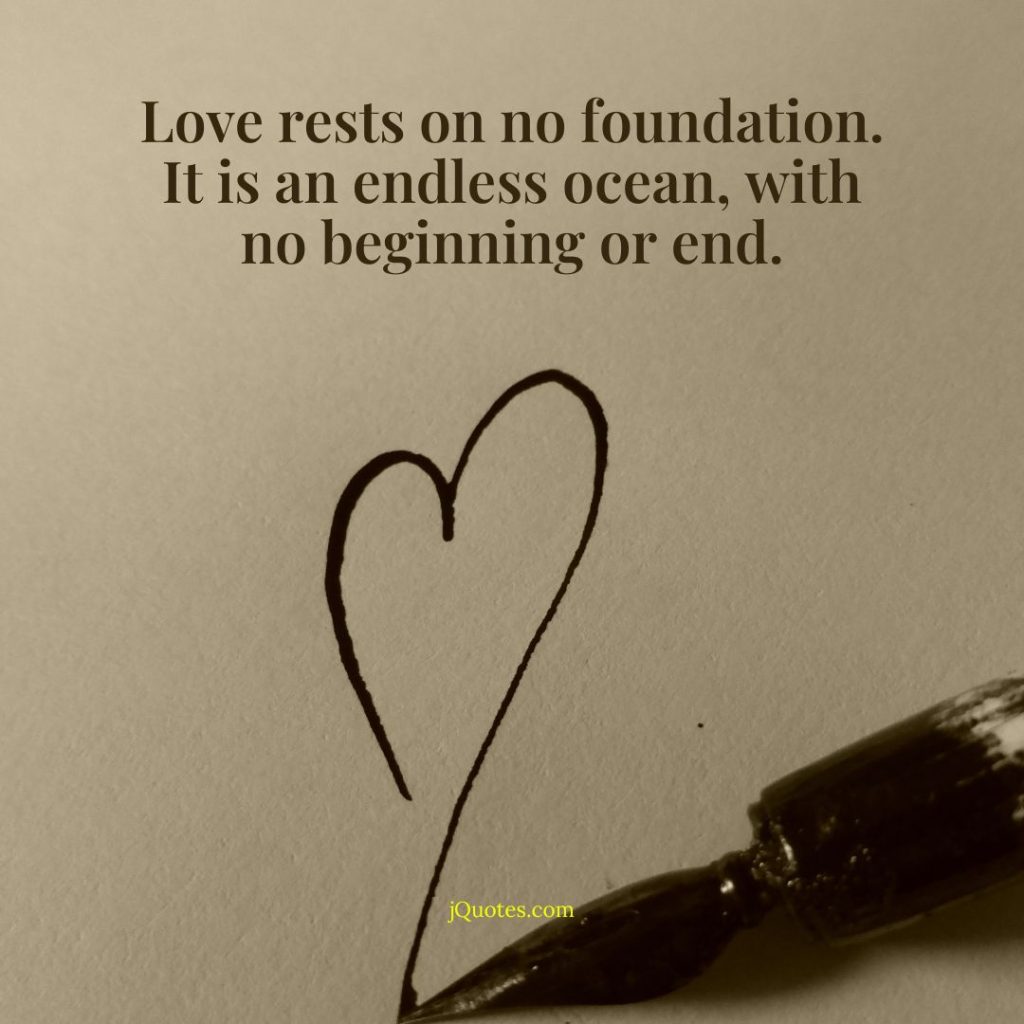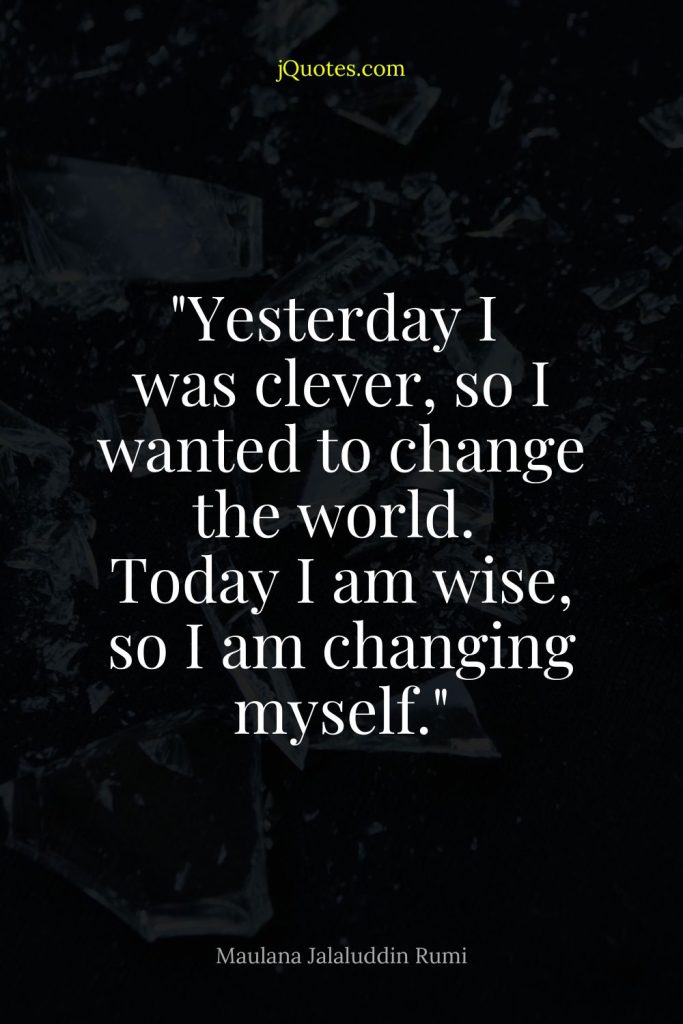Table of Contents
Introduction: Rumi’s Perspective on Love
In the vast ocean of spiritual poetry, few voices speak of love with the depth and passion of Maulana Jalaluddin Rumi. Born in 1207 in what is now Afghanistan, this 13th-century Persian poet and Sufi mystic transformed his personal experiences of love, longing, and divine connection into verses that continue to resonate across cultures and centuries.
For Rumi, love was not merely an emotion but a cosmic force—the very essence of existence and the path to divine truth. His understanding of love transcended conventional boundaries, encompassing romantic attachment, spiritual devotion, universal compassion, and the soul’s yearning for its divine source.
Rumi’s poetry on love flourished particularly after his transformative meeting with the wandering dervish Shams of Tabriz, whom many scholars believe became the embodiment of divine love in Rumi’s life and writings. Their spiritual connection catalyzed an outpouring of poetry that explores love in its myriad dimensions—from human to divine, from separation to union.
In this carefully curated collection, we present 25 of Rumi’s most profound quotes on love, arranged to illuminate different facets of this eternal force. Whether you’re seeking inspiration for a relationship, comfort during heartache, or deeper spiritual connection, Rumi’s timeless wisdom offers guidance that feels remarkably relevant in 2025.
Rumi Quotes on Divine Love
1. “Your task is not to seek for love, but merely to seek and find all the barriers within yourself that you have built against it.”
This profound quote reminds us that love’s essence already dwells within us. Rumi suggests that our spiritual journey involves not acquiring love from outside ourselves but removing the internal obstacles—fear, ego, past wounds—that prevent us from experiencing the love that is our true nature. This teaching appears throughout Rumi’s Masnavi and reflects the Sufi understanding that divine love is our original state.
Share this quote during spiritual retreats, therapy sessions, or when discussing inner growth work.
2. “Love is the bridge between you and everything.”

In this concise yet powerful statement, Rumi captures the essence of love as the universal connector. Beyond romantic notions, he points to love as the force that dissolves the illusory boundaries between self and other, human and divine. This perspective reflects the Sufi concept of wahdat al-wujud (unity of being), where love enables us to experience oneness with all creation.
Perfect for meditation groups, interfaith dialogues, or environmental conservation contexts.
3. “Love is the house of God and you are living in that house.”
This metaphorical quote beautifully expresses the Sufi understanding that divine love permeates all existence. By describing love as “the house of God,” Rumi suggests that love is not something to be sought in distant heavens but is the very reality we inhabit. Our spiritual awakening involves recognizing this omnipresent love that surrounds and sustains us.
Share when discussing spiritual homes, divine immanence, or during house blessings.
4. “Let the beauty of what you love be what you do.”
This beloved Rumi quote bridges divine love with purposeful action in the world. It suggests that authentic work flows from what we most deeply love and value. When our external activities align with our inner devotion, our lives become expressions of divine love. This teaching appears in Rumi’s discussions of vocational purpose and service.
Use when discussing career choices, creative pursuits, or finding meaning in daily work.
5. “There are lovers content with longing. I’m not one of them.”
This bold declaration reflects Rumi’s commitment to direct spiritual experience rather than theoretical devotion. Unlike those who might be satisfied with philosophical contemplation of the divine, Rumi insists on the immediate, lived experience of love’s union. This quote appears in his more ecstatic poems about divine intimacy.
Share when discussing contemplation versus action, spiritual practice, or overcoming complacency.
6. “Gamble everything for love, if you’re a true human being.”
This provocative challenge embodies Rumi’s radical prioritization of love above all worldly concerns. He suggests that risking everything for love—divine or human—is the most authentic expression of our humanity. This reflects the Sufi path of complete surrender (taslim) to divine love, even at the cost of social standing or material security.
Perfect for discussions about life priorities, courage in relationships, or spiritual commitment.
7. “Through love all that is bitter will be sweet. Through love all that is copper will be gold. Through love all dregs will become wine. Through love all pain will turn to medicine.”
his poetic passage celebrates love’s alchemical power to transform everything it touches. Using metaphors of transmutation familiar in Sufi literature, Rumi portrays love as the force that elevates the mundane to the sacred, suffering to wisdom. This reflects the Sufi understanding of love as the greatest transformative power in creation.
Share when discussing spiritual alchemy, transforming hardship, or the healing aspects of love.
Rumi Quotes on Romantic Love and Soulmates
8. “Lovers don’t finally meet somewhere. They’re in each other all along.”
This profound perspective on romantic connection suggests that true love transcends physical meeting—it’s a recognition of something that already exists within both parties. Rumi challenges conventional notions of love as something that happens between separate entities, instead portraying it as an awakening to a pre-existing unity. This reflects the Sufi concept that all souls originate from and return to the same divine source.
Perfect for wedding ceremonies, anniversary celebrations, or discussions about soulmate connections.
9. “The minute I heard my first love story, I started looking for you, not knowing how blind that was. Lovers don’t finally meet somewhere. They’re in each other all along.”
This extended version adds context to the previous quote, revealing how our search for love often begins with external seeking before we realize that true connection involves recognizing what’s already present within. The quote appears in Rumi’s collection of love poems dedicated to his spiritual companion, Shams of Tabriz.
Share during relationship counseling, discussions about authentic partnership, or when exploring the difference between infatuation and true love.
10. “Your heart and my heart are very, very old friends.”

This tender quote speaks to the soul-level familiarity many experience in profound relationships. Suggesting that hearts recognize each other from beyond time, Rumi points to the spiritual dimension of human connection. This reflects the Sufi concept of souls knowing each other in the pre-eternal realm before physical existence.
Use in contexts of deep friendship, reunion with old connections, or discussing spiritual dimensions of relationship.
11. “Goodbyes are only for those who love with their eyes. Because for those who love with heart and soul, there is no such thing as separation.”
This consoling perspective distinguishes between superficial attachment and authentic soul connection. Rumi suggests that true love transcends physical presence and absence, existing in a realm where separation is impossible. This reflects his teachings on love’s ability to transcend the limitations of time and space.
Share during times of physical separation, long-distance relationships, or when grieving the loss of a loved one.
12. “Love rests on no foundation. It is an endless ocean, with no beginning or end.”

Using the powerful metaphor of an infinite ocean, Rumi portrays love as boundless and self-existing, neither dependent on external circumstances nor confined by ordinary limits. This perspective challenges materialistic understandings of love as transaction or emotional exchange, pointing instead to its limitless, eternal nature.
Perfect for discussing unconditional love, spiritual dimensions of relationship, or during ocean-side ceremonies.
13. “This is love: to fly toward a secret sky, to cause a hundred veils to fall each moment. First to let go of life. Finally, to take a step without feet.”
In this mystical description, Rumi portrays love as a transcendent journey beyond ordinary reality. The imagery of falling veils represents how love progressively removes illusions that separate us from truth. The paradoxical “step without feet” points to love’s ability to carry us beyond physical limitations into spiritual realms. This quote appears in Rumi’s more esoteric teachings about love’s mystical dimensions.
Share when discussing spiritual aspects of partnership, transformative relationships, or during life transitions.
Rumi Quotes on Self-Love and Inner Connection
14. “You are not a drop in the ocean. You are the entire ocean in a drop.”
This famous quote revolutionizes our self-understanding by inverting conventional perspectives on individual identity. Rather than seeing ourselves as tiny fragments in an immense universe, Rumi suggests that each person contains the entirety of existence within themselves. This reflects the Sufi teaching that the human heart potentially mirrors all divine attributes.
Perfect for self-worth discussions, spiritual identity exploration, or meditation practices.
15. “Everything in the universe is within you. Ask all from yourself.”
Building on the previous quote, Rumi directs us to look inward rather than outward for fulfillment and wisdom. This teaching aligns with the Sufi emphasis on the heart as the true Kaaba (house of God), containing all knowledge and love one might seek externally. The quote appears in Rumi’s teachings about self-knowledge as the path to divine knowledge.
Share during self-discovery workshops, meditation retreats, or when discussing external seeking versus inner wisdom.
16. “What you seek is seeking you.”
This deceptively simple statement points to the mysterious reciprocity in spiritual seeking. Rumi suggests that our deepest yearnings are not random but reflect a cosmic correspondence—what we authentically long for is simultaneously drawing us toward itself. This reflects the Sufi understanding of divine love as both the seeker and the sought.
Use when discussing authentic desires, life purpose, or synchronicity in spiritual journeys.
17. “You were born with wings, why prefer to crawl through life?”
This metaphorical encouragement reminds us of our inherent capacity for spiritual elevation. Rumi challenges us to recognize and utilize our innate abilities rather than limiting ourselves to a diminished existence. This quote appears in his teachings about human potential and the soul’s natural inclination toward transcendence.
Share when discussing self-limitation, untapped potential, or spiritual awakening.
18. “Yesterday I was clever, so I wanted to change the world. Today I am wise, so I am changing myself.”

This quote charts the evolution from external ambition to inner transformation. Rumi suggests that true wisdom involves redirecting our reforming impulse from the outside world to our own consciousness. This reflects the Sufi emphasis on personal spiritual work as the foundation for authentic service to humanity.
Perfect for discussions about effective change, personal growth, or spiritual maturity.
Rumi Quotes on Love’s Transformative Power
19. “The wound is the place where the Light enters you.”
This profound insight reframes suffering in the context of love’s transformative power. Rumi suggests that our moments of greatest vulnerability and pain become the very openings through which divine light and love can penetrate most deeply. This teaching appears throughout his work, particularly in poems addressing how love transforms suffering into wisdom.
Share during times of healing, processing grief, or discussing emotional vulnerability.
20. “If light is in your heart, you will find your way home.”

This gentle assurance speaks to love’s guiding capacity. Rumi suggests that the light of love within us serves as an internal compass, directing us toward our spiritual home regardless of external circumstances. This reflects the Sufi understanding of the heart’s innate orientation toward its divine source.
Perfect for discussions about finding direction in life, spiritual homesickness, or returning to one’s authentic path.
21. “Dance, when you’re broken open. Dance, if you’ve torn the bandage off. Dance in the middle of the fighting. Dance in your blood. Dance when you’re perfectly free.”
This passionate exhortation celebrates how love enables joyful response even amid difficulty. The repeated instruction to “dance” represents whole-hearted engagement with life regardless of circumstances. This quote appears in Rumi’s teachings about the ecstatic aspects of love and reflects the sama (whirling meditation) practice of the Mevlevi Sufi order he founded.
Share in contexts of resilience, celebration amid hardship, or embodied spiritual practice.
22. “Let yourself be drawn by the stronger pull of that which you truly love.”
This guidance points to love’s magnetic capacity to orient our lives. Rumi encourages surrendering to love’s direction rather than forcing our path through willpower alone. This teaching appears in his discussions of vocation and life purpose, suggesting that authentic love naturally shows us our way.
Use when discussing career choices, major life decisions, or discerning one’s path.
23. “Close your eyes. Fall in love. Stay there.”

This succinct instruction encapsulates Rumi’s entire spiritual philosophy. The closing of eyes represents turning away from external distractions; falling in love signifies opening to divine reality; staying there suggests making this love-awareness one’s permanent dwelling place. This teaching appears in his guidance for spiritual practice.
Share during meditation instruction, contemplative prayer settings, or discussions about maintaining spiritual awareness.
24. “Love is the water of life. Everything other than love for the most beautiful God is agony of the spirit.”
This quote uses the essential metaphor of water to describe love’s life-giving nature. Rumi contrasts the nourishment of divine love with the spiritual suffering that comes from attaching to lesser loves. This teaching appears in his discussions of spiritual thirst and satisfaction.
Perfect for discussions about spiritual fulfillment, divine love, or the limitations of worldly attachment.
25. “In your light I learn how to love. In your beauty, how to make poems. You dance inside my chest where no one sees you, but sometimes I do, and that sight becomes this art.”
This beautiful passage describes the intimate relationship between divine inspiration and creative expression. Rumi reveals how his poetry emerges from momentary glimpses of the beloved dancing within his heart. This quote appears in his most personal reflections on the source of his poetic gift.
Share when discussing creative inspiration, artistic process, or the relationship between spirituality and creativity.
How to Apply Rumi’s Love Wisdom in Daily Life
Rumi’s profound insights on love aren’t meant to remain abstract philosophical concepts—they offer practical guidance for living with greater awareness and compassion. Here are five ways to embody Rumi’s love teachings in everyday life:
1. Practice Heart-Centered Mindfulness
Set aside 10 minutes daily to place your attention at your heart center. Breathe gently while visualizing love as a warm light expanding from your heart outward. This practice aligns with Rumi’s emphasis on the heart as the dwelling place of divine love and wisdom.
2. Transform Obstacles Through Love’s Perspective
When facing challenges, pause to ask: “How might love view this situation?” This shift in perception can transform conflicts from battles into opportunities for understanding. Keep a “love perspective” journal where you reframe difficult situations through the lens of compassion.
3. Cultivate Soul Friendship
Nurture relationships that reflect Rumi’s concept of spiritual companionship. These connections transcend superficial interaction, allowing for authentic sharing of both joys and struggles. Create regular sacred time with these companions—walking in nature, sharing meaningful conversation, or sitting in contemplative silence.
4. Embrace the Love in Service
Find ways to serve others that engage your natural gifts and passions. As Rumi teaches, “Let the beauty of what you love be what you do.” This might involve formal volunteer work or simply bringing more presence and care to everyday interactions. Notice how giving from authentic love energizes rather than depletes.
5. Dance with Life’s Rhythms
Rumi often used dance as a metaphor for spiritual engagement with life. Incorporate movement practices that help you embody love’s flow—whether through formal dance, yoga, tai chi, or simply mindful walking. Allow your body to express the joy and freedom that come with loving awareness.
The Historical Context of Rumi’s Love Poetry
To fully appreciate Rumi’s teachings on love, understanding their historical and cultural context proves invaluable. Rumi lived during the 13th century in the Persian-speaking world, a time of tremendous intellectual and spiritual ferment as well as political upheaval due to Mongol invasions.
Rumi began his career as a respected religious scholar and jurist in the Islamic tradition. His life transformed dramatically after meeting the wandering dervish Shams of Tabriz around 1244 CE. Their profound spiritual connection sparked Rumi’s evolution from scholar to mystical poet. After Shams’ mysterious disappearance (possibly murdered by jealous disciples), Rumi channeled his grief and spiritual longing into poetry that explores the many dimensions of love.
The cultural milieu in which Rumi wrote had a rich tradition of love poetry, including both secular romantic verses and spiritual allegorical works. What distinguished Rumi’s approach was his fusion of theological depth with passionate, accessible language and his ability to move fluidly between human and divine forms of love without rigid separation.
Rumi wrote primarily in Persian, the literary language of the eastern Islamic world, though he was also fluent in Arabic and occasionally included Arabic verses in his work. His two major collections are the Masnavi, a six-volume didactic poem often called “the Persian Quran,” and the Divan-e Shams-e Tabrizi, containing over 40,000 verses of ecstatic lyrical poetry.
The Mevlevi Sufi Order founded by Rumi continues to this day, known for their distinctive “whirling” meditation practice that embodies the central place of love in Rumi’s teachings—spinning around the heart while remaining centered in divine love.
FAQ About Rumi’s Poetry on Love
Who is the “beloved” in Rumi’s love poetry?
Rumi’s poetry operates on multiple levels simultaneously. The “beloved” can represent his spiritual master Shams of Tabriz, the divine presence (Allah), or the soul’s ultimate beloved. Many scholars note that the genius of Rumi’s poetry lies in its ability to speak to both human and divine love without separating them into distinct categories.
Was Rumi’s poetry originally intended as romantic love poetry?
While Rumi’s poetry employs romantic imagery and language, it primarily expresses spiritual love and the soul’s longing for divine connection. However, Rumi recognized all forms of love as interconnected manifestations of the same essential force. His work acknowledges that human love can serve as a bridge to divine love.
How have Rumi’s teachings on love been misinterpreted in Western culture?
In Western popularizations, Rumi’s poetry is sometimes divorced from its Islamic and Sufi spiritual context. Quotes are often shortened or modified to emphasize personal fulfillment rather than spiritual transformation. Understanding the original context enriches our appreciation of his teachings’ true depth.
Did Rumi write specifically about self-love?
While the modern concept of “self-love” wasn’t articulated as such in Rumi’s time, his teachings about recognizing the divine presence within oneself align with healthy self-regard. For Rumi, loving oneself properly means honoring the divine spark within—neither inflating the ego nor diminishing one’s true spiritual nature.
How did Rumi’s understanding of love differ from conventional religious views of his time?
Rumi emphasized direct experiential love of the divine over ritualistic observance or theological dogma. While firmly rooted in Islamic tradition, his approach emphasized the spirit over the letter of religious law, suggesting that love itself constitutes the highest form of worship and spiritual practice.
Related Quote Collections
Explore these complementary collections on jQuotes.com to deepen your journey with wisdom from various spiritual traditions:
- “Strive not to be a success, but rather to be of value.” – Albert Einstein
- 15 Powerful Rumi Quotes That Will Transform Your Perspective in 2025
- 25 Profound Rumi Quotes on Love That Will Open Your Heart | jQuotes
- 10 Profound Prophet Muhammad Quotes to Guide Your Daily Life | jQuotes
- “Try not to become a person of success but rather try to become a person of value.” – Albert Einstein | JQuotes.com
Final Thoughts
Rumi’s poetry reminds us that love is not merely an emotion or relationship state—it is the essential force binding creation together and the path leading us back to our divine source. Eight centuries after his death, his words continue to guide seekers toward a love that transcends boundaries between human and divine, self and other.
In a world often characterized by division and materialism, Rumi’s perspective on love offers a revolutionary alternative—inviting us to recognize the beloved in every face, to find the divine presence in our own hearts, and to let love transform even our deepest wounds into sources of light.
Whether you’re navigating the complexities of human relationships, seeking spiritual connection, or working to cultivate greater self-compassion, these 25 quotes provide touchstones for your journey. May Rumi’s timeless wisdom on love continue to open hearts and illuminate paths in 2025 and beyond.
Has Rumi’s Poetry Touched Your Heart?
Share in the comments below which quote resonated most deeply with you and how you apply Rumi’s wisdom in your life.
Don’t forget to bookmark jQuotes.com for daily inspiration and the world’s most comprehensive collection of wisdom from across traditions and throughout history.
- Powerful Philosophy Quotes in English to Transform Your Mindset Today
- Finding Solace in Faith: Meaningful Sad Islamic Quotes for Times of Hardship
- The best wealth is the richness of the soul. – Prophet Muhammad (PBUH) | JQuotes.com
- Anger burns good deeds as fire burns wood. – Prophet Muhammad (PBUH) | JQuotes.com
- Charity does not decrease wealth. – Prophet Muhammad (PBUH) | JQuotes.com






Leave a Reply